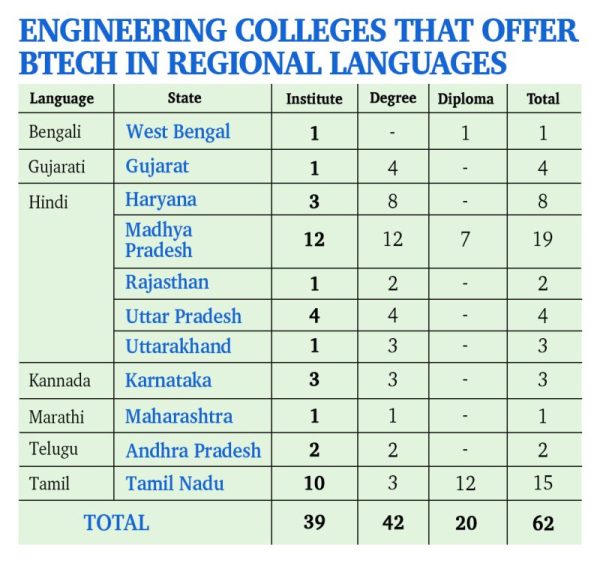[ad_1]
After a lukewarm start, the number of institutes offering engineering programmes in regional languages have doubled this year.
Data accessed by The Indian Express shows that the All India Council for Technical Education (or AICTE) has approved another 20 institutes for offering B.Tech degree programmes in regional languages in the academic year 2022-23, taking the total number to 39 across 11 states in the country.
The largest number of such institutes are now in Madhya Pradesh (12), followed by Tamil Nadu (10) and Uttar Pradesh (4). This year, Gujarati has been added to the list of languages offered, which includes Hindi, Marathi, Telugu, Kannada, Tamil and Bengali. Among them, Hindi is the most popular with 21 institutes opting to teach engineering in these languages.
The highest number of colleges offer Hindi, with about 21 institutes. Ten technical universities in Tamil Nadu have offered to teach in Tamil.
A total of 62 BTech. and Diploma courses will be available for students, with programs ranging from Computer Engineering and Mechanical Engineering to Information Technology. This comes as part of the push for teaching and learning in regional languages at every level as highlighted in the NEP 2020.

Speaking at a recent panel discussion on the completion of 2 years of the NEP 2020, AICTE Chairman Anil Sahasrabudhe emphasised the need to include regional languages in higher education. “Taking a leaf out of the NEP 2020, we found out that there is no regulation that stops teaching and learning (for higher education) in the mother tongue. It’s a myth that it can only be taught in English.” he said.
“We took this up very seriously and started advocating for our engineering institutes to teach in the mother tongue.” added Sahasrabudhe. He mentioned that such initiatives in the past had not succeeded because study material was not available in Indian languages. The Council has been translating books into regional languages using AI (Artificial Intelligence) based translation tools.
This is the second year that AICTE — in line with provisions of the new National Education Policy (NEP) that calls for education in one’s mother tongue as far as possible — has permitted engineering colleges to offer B.Tech programmes in regional languages.
The first year of this initiative had a slow start, with only 225 student enrolments out of the approved intake of 1,230. While Hindi was a popular choice with 116 student enrolments, Kannada had zero enrolments. For several other institutes, seats remained completely vacant.
Last year in November, the Union Education Ministry had announced that it would push for technical education, especially engineering, in regional languages, starting from the 2021-22 academic year. The Ministry had also indicated that some of the top engineering schools such as the IITs and NITs might be among the first to implement this.
The total budget for this initiative in its first year was Rs 3.294 crores which primarily includes the cost of translating books from English and printing them in the languages being offered. A total of 240 books were available for the Academic year 2021-22. The budget has increased to Rs. 18.6 crores for the Academic Year 2022-23, with 1056 books in 12 languages– Hindi, Gujarati, Odia, Bengali, Kannada, Urdu, Punjabi, Tamil, Telugu, Marathi, Assamese, Malayalam.
!function(f,b,e,v,n,t,s)
{if(f.fbq)return;n=f.fbq=function(){n.callMethod?
n.callMethod.apply(n,arguments):n.queue.push(arguments)};
if(!f._fbq)f._fbq=n;n.push=n;n.loaded=!0;n.version=’2.0′;
n.queue=[];t=b.createElement(e);t.async=!0;
t.src=v;s=b.getElementsByTagName(e)[0];
s.parentNode.insertBefore(t,s)}(window, document,’script’,
‘https://connect.facebook.net/en_US/fbevents.js’);
fbq(‘init’, ‘444470064056909’);
fbq(‘track’, ‘PageView’);
[ad_2]
Source link


